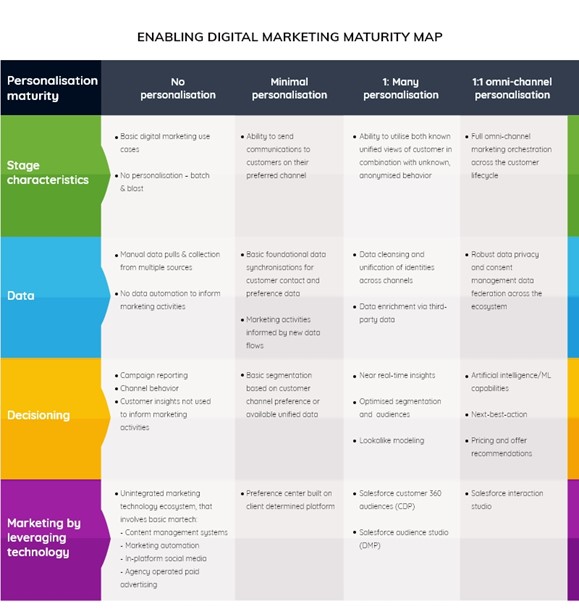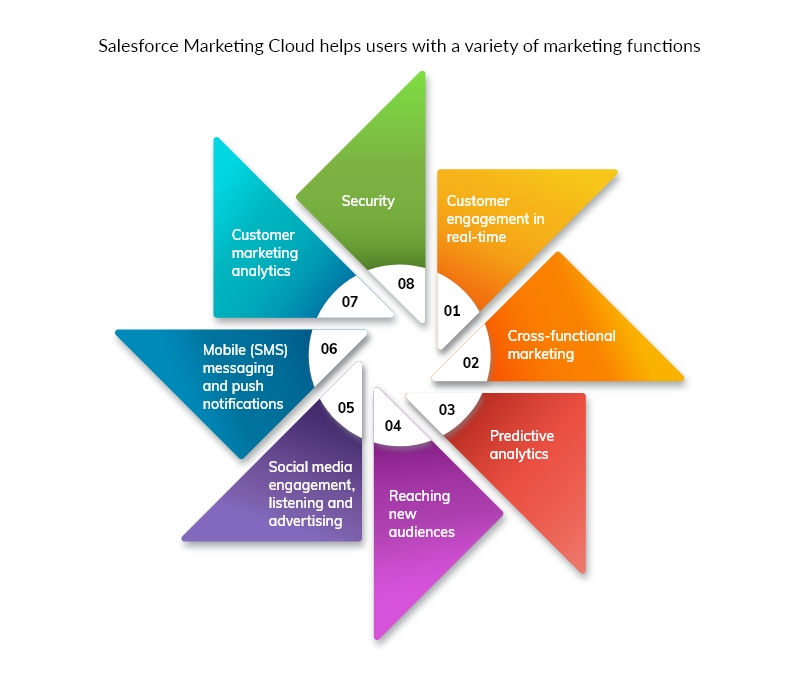What is the most important objective of a business? The importance of customer experience and the role of marketing technology. According to Salesforce’s recent State of Marketing 2020 report, 69% of customers now expect connected experiences. Leading research into MarTech today concludes that quality CX has three core elements: Personalised, proactive and unified marketing. A business that consistently delivers a great customer experience wins hearts and minds more frequently than companies that lack CX excellence.
However, what stands in the way of creating personalisation at scale and delivering a true 1:1 customer journey across devices? Knowing what a good customer experience looks like, and delivering it, are not the same.
Let’s walk through how to level up your personalisation game.
Where are you on the Digital Marketing Maturity Curve?

Where are you on the Digital Marketing Maturity Curve? An excellent initial question to ask because the breadth of digital maturity varies considerably depending on the focus. Your company’s specific goals and priorities on your road to digital maturity will be determined by the size, structure, and industry in which you operate. However, there are fundamentals that organisations of all sizes and in all industries must have in place to navigate the marketing maturity curve and seize the benefits effectively.
When mapped together, these factors reveal a marketing maturity curve. The curve highlights five levels of organisational maturity.
- Personalisation – How to get that 1:1 omnichannel personalisation
- Stage characteristics – From basic to 360-degree view
- Data – How much customer data do you have and how easy is it to access?
- Decisioning – Analytics to AI and ML
- Marketing by leveraging technology
This is where Salesforce Marketing Cloud comes into play, allowing businesses to enhance their digital marketing, get to know their consumers, build strong, lasting customer relationships, and improve their overall brand image.
What is Salesforce Marketing Cloud?
Salesforce Marketing Cloud (SFMC) is a digital marketing platform that enables you to optimise your marketing efforts by customising every customer interaction. Businesses use Salesforce Marketing Cloud to redefine customer interactions for better business outcomes by unifying all marketing channels.
Changing Tides!
The business-critical importance of digitalisation and all related measures in companies has become clear, especially in the last two years. While every business is unique, there are some common challenges:
- Connecting information from multiple sources
- Using customer data responsibly and ensuring the protection of personal data
- Providing personalised marketing across channels
- Dealing with the continuous evolution of customer needs
- Driving adoption of new tools & processes for internal teams & across the organisation
To address these challenges, Salesforce Marketing Cloud enables your business to deliver personalised engagement to your customers across all platforms, including digital, advertising, email to web, social, and more.

Salesforce Marketing Cloud comprises two types of modules
Studios – Studios are used to manage content and support different aspects of marketing channels, such as multi-channel campaign execution, dynamic customer journeys, pre and post-campaign analytics, audience building/segmentation, social media engagement/advertising, and a data management platform. Studios are used to manage and engage with communication channels by activating customer data. Each studio has its specific area of focus, and businesses opt to work with multiple studios to improve their marketing efforts. Email Studio, Interaction Studio, Advertising Studio, Automation Studio, Social Studio, and Mobile Studio.
Builders – Builders are used to manage data and campaign automation. Builders are used in the Marketing Cloud platform to manage data, content, and customer journeys. They must be integrated with studios to build fleshed-out journeys – Journey Builder, Audience Builder, Content Builder, Brand Builder, Analytics Builder (Standard reports, datorama reports for Marketing Cloud)
Digital Maturity with Salesforce Marketing Cloud – A strategic approach to get started!
The decision to implement an industry-leading marketing automation solution is a critical first step in developing an organisation’s digital marketing capabilities. Nevertheless, decision-makers must set the expectation that any new software is merely the tool(s), not the solution.
In a data-driven, always-on environment, the next generation of CMOs must grasp the possibilities of marketing cloud technologies. With this user-friendly, automated Salesforce marketing solution, you can get qualified leads, build an accurate and in-depth customer database, and much more. Here are the three most significant ways to stay on top of the digital maturity curve!
1. Connecting information from multiple sources
Businesses of all sizes typically have difficulty submitting and receiving data from various data sources. They often use transactional systems, customer loyalty programs, data lakes, and other technologies to manage customer data in massive quantities, which is very tedious to maintain. Salesforce Marketing Cloud enables you to merge all relevant data from many sources into a single unified interface to obtain a single 360 view of your customers and activate this data on your preferred channel.
2. Personalisation
According to Evergage, 99% of marketers say personalisation helps advance customer relationships, with 78% claiming it has a “strong” or “extremely strong” impact. But this is easier said than done. In fact, providing personalised content and a consistent, connected customer experience is a massive problem for any business.
With the help of Salesforce Marketing Cloud, you can also understand your customers’ preferences, as well as their interests, purchasing patterns, and preferred communication channels. “The right message to the right person through the right channel at the right time!” Mastering multi-moment marketing allows you to create personalised campaigns at scale, build lasting customer relationships, increase loyalty, and maximise customer lifetime value (CLV) in the long run. These orchestrated, omnichannel customer journeys act as the foundation for automating and personalising communications and interactions with your customers.
3. Predicting the customer’s behaviour
Forecasting your consumers’ behaviour and understanding what customers want allows you to make smarter decisions. Based on previous interactions across channels, Salesforce’s Einstein Al can help analyse and predict future customer behaviours and tailor their journey accordingly. These insights allow you to personalise every interaction and, deliver timely & impactful content across channels and ensure connected omni-channel experiences.
Can any Company use Salesforce Marketing Cloud & How Can I Get Started?
Salesforce Marketing Cloud is used by businesses of all sizes across all industries. While Marketing Cloud is frequently seen as an enterprise-level platform (which it is), the various editions (Implement, Scale, Automate, Evolve) and flexible features make it adaptable to companies of all sizes.
Your company should use Marketing Cloud if you:
- Have transactional purchases/no long sales cycles
- Need to compile large amounts of behavioural data from multiple sources
- Want to segment contacts using multiple datasets that aren’t stored in your core Salesforce database
Salesforce figures show that companies that have deployed Marketing Cloud have seen an average of 43% increase in marketing campaign ROI, 44% increase in lead volume and 46% faster campaign deployment. Digital maturity has a direct impact on operational efficiency and revenue. With Marketing Cloud and its studios and builders, you can develop one-to-one relationships at scale. Not only does it encourage contacts to convert, but it’ll also make it more enticing for a customer to become a loyal customer.
The first step is to create a strategy for maturing your company by matching its people, processes, and technology with its present state and desired future state. This should include the maturity components of data, content, and analytics. This phase necessitates creating a roadmap to organise all of these components, which will undoubtedly boost profitability.
Marketing Cloud is a highly effective suite which enables organisations to track & measure the true ROI of their marketing initiatives which in turn successfully boosts customer engagement and hit their digitalisation goals!
And you can always look into our marketing operations consulting services if you want to drive key changes throughout your organisation for revenue impact.
Notes:
- https://www.salesforce.com/eu/products/marketing-cloud/platform/
- https://www.salesforce.com/in/products/marketing-cloud/faq/
- https://trailhead.salesforce.com/content/learn/modules/marketing-cloud-for-salesforce-partners/learn-about-todays-marketing-challenges-for-partners
- https://blog.hubspot.com/marketing/data-personalize-marketing-li
- https://www.salesforce.com/editions-pricing/advisory-services/marketing-cloud/

